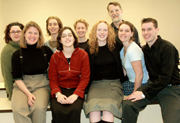
Left to right: Stephanie Desjardins, Anna Woodrow, Sara Teitelbaum,
Marie-Odile Magnan, Isabelle Lantagne, Andrea Sharkey, Professor Bill
Reimer, Deatra Walsh, and Mike Burns. Cindy Bryant was absent when the
photo was taken.
Photo by Andrew
Dobrowolskyj
|
by
Sigalit Hoffman
When master’s student Isabelle Lantagne left home to do 10 days of
interviews last summer, she didn’t know what to expect.
“Being a field researcher is surprise after surprise,” she said.
“You have to be open to new things.”
Lantagne and a team of Concordia researchers gathered to share their experiences
studying rural communities across Canada. They were part of the New Rural
Economy Project (NRE), which is studying 2,000 rural households. Eighteen
universities and 22 researchers are involved in the project. This summer,
Concordia sent a team of seven researchers to gather information.
“What we did across Canada has never been done before,” said
the project’s research manager, Anna Woodrow. “We are really
doing groundbreaking work.”
Rural change
The two-year-old project set out to understand the changes taking place
in rural communities, and how the people who live in those communities
are adapting. Rural communities are aging, and that includes their economies,
Woodrow explained. While they used to rely on resource industries like
logging and fishing, these communities are becoming service-centred.
The student researchers learned more than they expected.
“We had to justify our methodology,” Lantagne said of a community
member who helped set up interviews. At a workshop last week sponsored
by the project, Lantagne and her partner Marie-Odile Magnan gave a presentation
called “Confronting the Realities of Rural Field Work: The Education
Gap,” in which she explained what it was like to work on an academic
project with a person who did not have a university education.
“You had to try to phone [interview subjects] three times. It was
part of the methodology,” Lantagne explained. “To her, it did
not make any sense. It was not practical to do that.”
In her presentation, called “Gathering Data: BBQ Etiquette and Other
Things,” master’s student Andrea Sharkey spoke of feeling awkward
when she met her interviewees in a social setting. “When you’re
dealing with someone in a research setting, there’s a certain comfort
level because you know our roles,” the 24-year-old sociology student
said.
“In a social setting, you feel somewhat like you’re intruding
in their lives.”
Not only did the experience teach her about field work, it also piqued
her interest. “Although I’m from a rural community, that had
never been an interest of mine,” said the Chesterville, Ont., native.
“Through the project, I realized that it was interesting.” Sharkey,
who is graduating this year, is studying youth and communication in the
rural context.
Strenghtening rural communities
Not only did the project help sharpen the Concordia team’s research
skills, it might eventually provide rural communities with tools for empowerment.
The Canadian Rural Revitalization Foundation (CRRF), which initiated the
NRE project, has a history of helping rural communities.
Six years ago, the CRRF had its annual conference in Coaticook, Que. The
town set up a billeting system and converted a cow showroom into a conference
room. High school students were trained to wait tables and the meals were
prepared in the town high school.
When the conference ended, the town marketed itself as a conference centre.
Woodrow said that rural communities bring to mind close-knit environments.
“It’s a part of Canadian heritage.”
|
|
|



